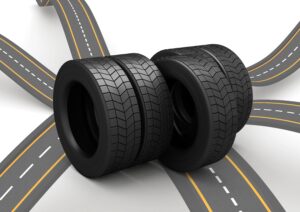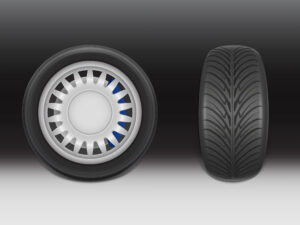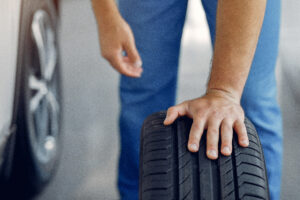Ultimate Guide to Choosing the Right Ritz Tyre Size for a Smooth and Safe Drive

Man choosing a car and checking tires
Choosing the correct Ritz tyre size is crucial for ensuring a comfortable and efficient driving experience. The right tyres not only enhance safety and fuel efficiency but also improve overall vehicle performance. If you are a Maruti Ritz owner looking for the best tyre size, pressure recommendations, and upgrade options, this guide is for you.
The Maruti Ritz tyre size determines how well your car grips the road, handles different driving conditions, and maintains fuel economy. Incorrect tyre sizes can lead to uneven wear, poor handling, and increased fuel consumption. In this guide, we will cover everything from the best tyres for Ritz to Ritz tyre pressure recommendations and fuel-efficient tyres for Ritz. Additionally, we will discuss the benefits and considerations of Ritz alloy wheels, helping you make an informed decision.
Understanding the Recommended Ritz Tyre Size
Selecting the right Ritz tyre size is crucial for optimizing performance, safety, and fuel efficiency. The tyre size impacts multiple aspects of the vehicle, including ride comfort, handling, braking efficiency, and even fuel consumption. Choosing an incorrect size can lead to reduced stability, increased wear and tear, and a negative effect on mileage.
Why Choosing the Correct Ritz Tyre Size is Important?
Tyres are the only point of contact between your vehicle and the road, making them one of the most critical components for a smooth and safe drive. Using a size that is not recommended by the manufacturer can lead to:
- Reduced Handling Stability: A wider or narrower tyre than the recommended size can negatively affect cornering ability and overall vehicle balance.
- Increased Fuel Consumption: Incorrectly sized tyres can increase rolling resistance, which forces the engine to work harder, leading to poor fuel efficiency.
- Uneven Tread Wear: A mismatch in tyre size can cause uneven tyre wear, reducing the lifespan of the tyres and requiring frequent replacements.
- Speedometer Inaccuracy: The wrong tyre size can affect the speedometer reading, causing incorrect speed and distance measurements.
- Braking Performance Issues: Tyre size plays a role in braking efficiency, and a deviation from the recommended size can result in increased stopping distances.
Standard Ritz Tyre Sizes for Different Variants
Different Maruti Ritz models come with specific tyre sizes suited to their design and performance requirements. Here’s a breakdown of the standard Ritz tyre size for various variants:
- LXi, VXi, and VDi variants: These models are equipped with 165/80 R14 tyres, which offer a balance of fuel efficiency and ride comfort.
- ZXi and ZDi variants: These versions come with 185/70 R14 tyres, providing improved road grip, better stability, and enhanced braking performance.
- VXi Automatic: The automatic variant also uses 165/80 R14 tyres, designed for smooth city driving and better mileage.
Breaking Down the Ritz Tyre Size Code
Understanding tyre size codes can help you make better decisions when purchasing new tyres. Let’s take 165/80 R14 as an example:
- 165: This is the tyre’s width in millimeters, measured from one sidewall to the other. A wider tyre provides better grip but may reduce fuel efficiency.
- 80: This represents the aspect ratio, which is the height of the tyre’s sidewall as a percentage of its width. A higher aspect ratio generally means a more comfortable ride.
- R: This stands for radial construction, which is the most common and advanced type of tyre design, providing durability and flexibility.
- 14: This is the diameter of the wheel rim in inches. It must match the rim size of the car to ensure a proper fit.
Best Tyres for Ritz: Top Recommendations
Selecting the best tyres for Ritz depends on your driving style, budget, and road conditions. Some of the most reliable brands offer tyres specifically designed for fuel efficiency, durability, and safety.
Popular tyre choices for Maruti Ritz include:
- Apollo Amazer 4G Life – Known for long-lasting durability and good road grip.
- Michelin Energy XM2 – Ideal for fuel efficiency and comfort on long drives.
- Bridgestone B290 – Offers a balanced performance with good handling and braking efficiency.
- MRF ZLX – Provides strong grip and enhanced braking stability.
If you frequently drive on highways, tyres with better traction like Michelin Energy XM2 or Bridgestone B290 are great options. For city driving and cost-effectiveness, Apollo Amazer 4G Life is an excellent choice. For more insights on tyre brands, check out Is Apollo Tyre Good?
Ritz Tyre Pressure Recommendation: Ensuring Optimal Performance
Maintaining the correct Ritz tyre pressure recommendation is essential for safety, mileage, and tyre longevity. Incorrect tyre pressure can lead to poor handling, uneven tread wear, and reduced fuel efficiency.
Recommended tyre pressures for different driving conditions:
- For normal city driving, front tyres should be inflated to 32 PSI, and rear tyres should be at 30 PSI.
- For highway driving, increasing the pressure slightly to 33 PSI for the front tyres and 32 PSI for the rear tyres can enhance stability and fuel efficiency.
- When carrying heavy loads, it is recommended to maintain 35 PSI in the front tyres and 33 PSI in the rear tyres for better weight distribution and handling.
Checking tyre pressure every two weeks ensures optimal performance. Low tyre pressure increases rolling resistance, leading to higher fuel consumption, while over-inflated tyres can cause reduced traction and uneven wear.
Upgrading to Ritz Alloy Wheels: Pros and Cons
Many Maruti Ritz owners consider upgrading to Ritz alloy wheels for enhanced aesthetics and performance. Alloy wheels provide several benefits but also come with a few drawbacks.
Advantages of Alloy Wheels:
- Improved handling and steering response, making driving more precise.
- Enhanced aesthetics, giving the Ritz a more premium look.
- Lightweight construction, reducing the car’s overall weight and improving fuel efficiency.
- Better heat dissipation, which helps prevent overheating during long drives.
Disadvantages of Alloy Wheels:
- Alloy wheels are more expensive than steel wheels.
- They can be more prone to damage when driving on rough or pothole-filled roads.
For Ritz owners looking for a sporty and stylish upgrade, 14-inch alloy wheels are the best fit as they match the stock tyre size. Some drivers also opt for 15-inch alloy wheels, but these may require modifications or a different tyre profile to maintain accurate speedometer readings and handling balance.
Fuel-Efficient Tyres for Ritz: Maximizing Mileage
Choosing fuel-efficient tyres for Ritz can help reduce fuel consumption and improve overall driving performance. Fuel-saving tyres are designed to minimize rolling resistance, allowing the car to move more effortlessly.
Key features of fuel-efficient tyres include:
- Low rolling resistance to reduce friction with the road surface.
- Lightweight material to enhance mileage.
- High tread life to ensure durability.
Popular fuel-efficient tyre options for the Maruti Ritz include:
- Michelin Energy XM2, which offers excellent mileage and long-lasting tread life.
- Apollo Amazer XP, designed for city and highway driving with optimized fuel efficiency.
- Bridgestone Ecopia EP150, which provides a great balance between fuel savings and comfort.
Ensuring that your tyres are properly inflated based on the Ritz tyre pressure recommendation further helps in maintaining fuel efficiency and prolonging tyre lifespan.
Get Expert Tyre Services with KwikFix Auto
If you need professional tyre replacement, balancing, or puncture repairs, KwikFix Auto offers convenient doorstep services in Mumbai, Thane, and Navi Mumbai. Get expert assistance for your Ritz tyre size and upgrades today!
Call +91 9950 345 345 or visit KwikFix Auto to schedule your service now.
Frequently Asked Questions
Q1. What is the standard tyre size for Maruti Ritz?
A1. The standard Ritz tyre size varies by model. The LXi, VXi, and VDi variants use 165/80 R14, while the ZXi and ZDi variants come with 185/70 R14 tyres.
Q2. Which tyre brand is best for Ritz?
A2. The best tyre brand depends on driving needs. Apollo Amazer 4G Life is great for durability, Michelin Energy XM2 is fuel-efficient, and Bridgestone B290 offers balanced performance.
Q3. What is the recommended tyre pressure for Ritz?
A3. The recommended Ritz tyre pressure is 32 PSI for the front tyres and 30 PSI for the rear tyres in normal conditions. For highway driving, a slightly higher pressure is advised.
Q4. Can I upgrade my Ritz tyre size?
A4. Yes, you can upgrade from 165/80 R14 to 185/70 R14 for better grip and stability. However, ensure that your car’s suspension and wheel wells can accommodate the change.
Q5. Are alloy wheels better for the Maruti Ritz?
A5. Yes, Ritz alloy wheels improve handling and aesthetics, but they are more expensive than steel wheels and may be prone to damage on rough roads.
Q6. How often should I check my tyre pressure?
A6. It is best to check your Ritz tyre pressure every two weeks or before long trips to ensure optimal performance.
Q7. can I buy new tyres for my Ritz?
A7. Tyres can be purchased online from manufacturers like Apollo, Michelin, and Bridgestone, or from trusted local dealers.
Q8. What are the best fuel-efficient tyres for Ritz?
A8. Some of the best fuel-efficient tyres for Ritz include Michelin Energy XM2, Apollo Amazer XP, and Bridgestone Ecopia EP150, all designed to reduce fuel consumption.





